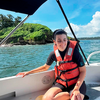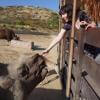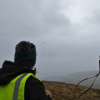With new technologies revolutionizing data collection, wildlife researchers are becoming increasingly able to collect data at much higher volumes than ever before. Now we are facing the challenges of putting this information to use, bringing the science of big data into the conservation arena. With the help of machine learning tools, this area holds immense potential for conservation practices. The applications range from online trafficking alerts to species-specific early warning systems to efficient movement and biodiversity monitoring and beyond.
However, the process of building effective machine learning tools depends upon large amounts of standardized training data, and conservationists currently lack an established system for standardization. How to best develop such a system and incentivize data sharing are questions at the forefront of this work. There are currently multiple AI-based conservation initiatives, including Wildlife Insights and WildBook, that are pioneering applications on this front.
This group is the perfect place to ask all your AI-related questions, no matter your skill level or previous familiarity! You'll find resources, meet other members with similar questions and experts who can answer them, and engage in exciting collaborative opportunities together.
Just getting started with AI in conservation? Check out our introduction tutorial, How Do I Train My First Machine Learning Model? with Daniel Situnayake, and our Virtual Meetup on Big Data. If you're coming from the more technical side of AI/ML, Sara Beery runs an AI for Conservation slack channel that might be of interest. Message her for an invite.
Header Image: Dr Claire Burke / @CBurkeSci

Explore the Basics: AI
Understanding the possibilities for incorporating new technology into your work can feel overwhelming. With so many tools available, so many resources to keep up with, and so many innovative projects happening around the world and in our community, it's easy to lose sight of how and why these new technologies matter, and how they can be practically applied to your projects.
Machine learning has huge potential in conservation tech, and its applications are growing every day! But the tradeoff of that potential is a big learning curve - or so it seems to those starting out with this powerful tool!
To help you explore the potential of AI (and prepare for some of our upcoming AI-themed events!), we've compiled simple, key resources, conversations, and videos to highlight the possibilities:
Three Resources for Beginners:
- Everything I know about Machine Learning and Camera Traps, Dan Morris | Resource library, camera traps, machine learning
- Using Computer Vision to Protect Endangered Species, Kasim Rafiq | Machine learning, data analysis, big cats
- Resource: WildID | WildID
Three Forum Threads for Beginners:
- I made an open-source tool to help you sort camera trap images | Petar Gyurov, Camera Traps
- Batch / Automated Cloud Processing | Chris Nicolas, Acoustic Monitoring
- Looking for help with camera trapping for Jaguars: Software for species ID and database building | Carmina Gutierrez, AI for Conservation
Three Tutorials for Beginners:
- How do I get started using machine learning for my camera traps? | Sara Beery, Tech Tutors
- How do I train my first machine learning model? | Daniel Situnayake, Tech Tutors
- Big Data in Conservation | Dave Thau, Dan Morris, Sarah Davidson, Virtual Meetups
Want to know more about AI, or have your specific machine learning questions answered by experts in the WILDLABS community? Make sure you join the conversation in our AI for Conservation group!
No showcases have been added to this group yet.
- @ImaniWilson
- | She / Her
Zoology with a placement year graduate from Bangor University. Interested in large African mammal movement and behaviour in response to climate change, particularly African elephants
- 0 Resources
- 0 Discussions
- 13 Groups
- @Fatuma
- | She/Her
I aim to transition my career towards conservation technology after gaining two years of experience in the tech industry.
- 0 Resources
- 0 Discussions
- 13 Groups
- @Heloise
- | She / Her
Bio-acoustician, marine biologist, marine mammal specialist, drone enthusiast
- 0 Resources
- 0 Discussions
- 9 Groups
- 0 Resources
- 0 Discussions
- 1 Groups
- @Ferrugem
- | They/Them
Latin American environmental scientist.
- 0 Resources
- 0 Discussions
- 2 Groups
- @TempleB
- | she
- 0 Resources
- 0 Discussions
- 1 Groups
- @katja
- | she/her
AI/ML consultant for climate/environment solutions industry
- 0 Resources
- 0 Discussions
- 5 Groups
- @karinnacvijanovich
- | she/her
- 0 Resources
- 1 Discussions
- 7 Groups
- @amklovrza
- | she / her
Hello! My name is Anabelle Marques Klovrza and I am a Ph.D. student at Dawson's lab. I am studying community assembly of island-like environments, and in trying to connect it with the vulnerability and fragility of the ecosystem.
- 0 Resources
- 0 Discussions
- 8 Groups
- @Giu.Appel
- | Her
Brazilian biologist, PhD in Ecology and 10 yrs of experience in the Amazon with bat bioacoustics
- 0 Resources
- 1 Discussions
- 5 Groups
- @Dominik
- | He/Him
PhD Student on bio- and ecoacoustics at the University of Freiburg (GER)
- 0 Resources
- 3 Discussions
- 2 Groups
I am nature lover and now lost the tolerance to just be an admirer watching its destruction. Hence joining this crew to contribute my supportive work much lesser than a penny worth
- 0 Resources
- 0 Discussions
- 3 Groups
Operating the largest tropical forest camera trap network globally, TEAM Network has accumulated over 2.6 million images. How can large datasets coupled with new techniques for data management and analysis provide...
28 April 2016
Camera traps have revolutionised wildlife research and conservation, enabling scientists to collect photographic evidence of rarely seen and often globally endangered species, with low expense, relative ease, and...
20 April 2016
Thousands of papers and reports about flora and fauna are published each year. While peer-reviewed published information is vitally important to conservation organisations, the ever-increasing mountain of information...
5 April 2016
When Victoria Espinel, President and CEO of BSA | The Software Alliance, spoke at the WWF Fuller Symposium, she took us on a whistle-stop tour of case studies where software and data are transforming our understanding...
10 March 2016
The Captain Planet Foundation is offering EcoTech grants in the amount of $2,500 to engage children in inquiry-based project in STEM fields.
18 February 2016
New horizon scanning report published this month identifies 15 emerging threats and opportunities for global biodiversity.
3 February 2016
From artificial “sniffer” technologies to portable DNA sequencers, the Wildlife Crime Tech Challenge received hundreds of innovative ideas to help stamp out wildlife crime. Now, the Challenge is proud to announce 16...
22 January 2016
Dr. Lucas Joppa, Scientist at Microsoft Research, considers the evolving impact of data in conservation and society. He examines the difference between ‘big data’ and ‘small data’, and explores how models such as the...
22 December 2015
John Amos, President of SkyTruth, explores how remote sensing is being used in conservation today and the importance of sky-truthing. He examines the role that citizen scientists can play in increasing transparency in...
21 December 2015
Gary Atkinson, Director of Emerging Technologies at ARM, explains why we should be interested in the Internet of Things. Could it be a game changer for conservation?
10 December 2015
The 2015 Fuller Symposium brought together thought leaders in science, policy, business, conservation and development to tackle emerging issues facing our planet. This framing piece was developed to support a Fuller...
26 November 2015
Article
Traceability (knowing where products come from and how they are made) is a foundational pre-cursor for many sustainability interventions. While many tools have been developed to offer high-level insight about the...
26 November 2015
August 2025
event
September 2025
event
event
event
event
October 2025
event
event
event
December 2025
event
March 2026
February 2023
event
event
January 2023
17 Products
Recently updated products
| Description | Activity | Replies | Groups | Updated |
|---|---|---|---|---|
| Hi Ellie, thanks for your interest. So I have two possible explanations why the camera traps I used did not release, even though I found otter droppings directly in front of my... |
|
AI for Conservation, Animal Movement | 4 years 11 months ago | |
| Samara P. El-Haddad Wildlife Conservation Junior Specialist at Lebanon Reforestation Initiative (LRI)... |
|
AI for Conservation, Community Base | 5 years ago | |
| How neat, thanks for sharing! We'd love to hear more about your drone project once it's underway, please keep us updated on that one! |
|
AI for Conservation, Emerging Tech | 5 years 1 month ago | |
| Great talk! I thoroughly enjoyed it. Some high schoolers have done small AI projects(s) and have interest in the wildlife. What resources would you all suggest to further... |
|
AI for Conservation, Camera Traps | 5 years 1 month ago | |
| Author: Jody Tucker, U.S. Forest Service, Pacific Southwest Region Carnivore Monitoring ProgramFigures below text in order (Fig 1... |
|
AI for Conservation, Emerging Tech | 5 years 1 month ago | |
| What better way to celebrate Endangered Species Day 2020 than try a new technology to protect them? If you're planning to be out and... |
|
AI for Conservation, Emerging Tech | 5 years 3 months ago | |
| DeepForest docs are here. https://deepforest.readthedocs.io/ Welcome to have a look. My experience is that individual trees cannot be distinguished in satellite... |
|
AI for Conservation | 5 years 4 months ago | |
| Steph, thank you so much for this, this is wonderful :) Really, really apreciate you sharing this with me :) Diving into all of the wonderful resources from you, thank you so very... |
|
AI for Conservation | 5 years 4 months ago | |
| A call put out over on Twitter by Jesse Alston might be of interest here - both for conservationists and grad students. Looks like... |
|
AI for Conservation | 5 years 4 months ago | |
| This can be done, happy to help :) But I think I need to understand the situation a little bit more. Do you already have the data for training / inference? Do you have any... |
|
AI for Conservation | 5 years 4 months ago | |
| Hi there this post on Conservation X labs recently came up on designing softwarre for individual horse recognition: https://... |
|
AI for Conservation | 5 years 5 months ago | |
| Wildlife Insights launched their online platform hosting over 4 million camera trap images. They use AI to automatically classify the... |
|
AI for Conservation | 5 years 8 months ago |






























